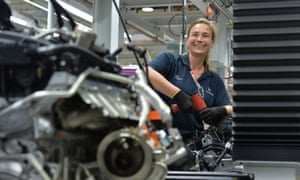Manufacturing of engines destined for South Africa plant is switched to Germany

Engine production at BMW’s Hams Hall plant near Birmingham in 2015.
Photograph: BMW press office
BMW has moved some of its engine production out of the UK because of Brexit uncertainty.
The carmaker said it had switched manufacturing of engines destined for its South Africa plant to Germany from its Hams Hall factory in the West Midlands. It made the decision to ensure that cars assembled in South Africa – which manufactures for the EU markets – comply with trade rules, avoiding steep tariffs.
“Hams Hall doesn’t build any South Africa products any more, which is of course bad for the UK because that specific engine is not being built here, is not providing labour any more,” said Oliver Zipse, BMW’s production chief, speaking at the launch of the new electric Mini in Oxford.
Decisions on reallocating production from the UK can be taken “very quickly”, and in some situations “you will lose work in this country”, added Zipse. He is tipped by some to take over as BMW chief executive following Harald Krüger’s decision last week not to apply to extend his term in the post.
The Hams Hall plant, which employs about 800 workers near Birmingham, has not seen any drop in output of its petrol and diesel engines because of the decision, BMW said. Engines made at the UK plant were rerouted from South Africa to its plant in Spartanburg, South Carolina.
However, the decision highlights the difficulties caused by Brexit for the British car industry, which is closely integrated with the EU. The UK is scheduled to leave the EU on 31 October, and both Conservative party candidates to be the next prime minister have said they are prepared to leave without a deal.
Car industry executives have been among the most outspoken opponents of a no-deal Brexit, which could see the imposition of tariffs of 10% on cars and 4.5% on components imported into the EU from the UK, as well as potentially causing delays at the border.
It would also have complex knock-on effects further down the supply chain for parts that cross international borders multiple times, requiring new documentation to track where suppliers are based.
BMW has already put in place computer systems capable of dealing with the UK’s exit under multiple scenarios, Zipse said.
“We still hope for a non-hard Brexit, for a negotiated agreement in any form and of course to have tariffs in any form is harmful,” he added.